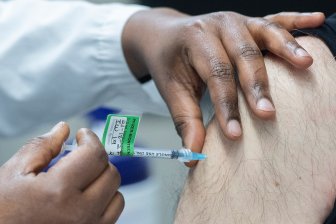Got COVID-19 again? What you need to know about reinfections – National | Globalnews.ca
Toronto resident Leshae Moses has been infected with COVID-19 four times.
The 22-year-old personal support worker says she was reinfected with the virus despite being fully vaccinated. But she is not worried about catching it again.
“I think I’ll be okay,” Moses said.
Even as new COVID-19 cases in Canada are declining, the highly-transmissible Omicron variant is causing a high rate of reinfection among the Canadian population, experts say.
Another case in point: Prime Minister Justin Trudeau tested positive for COVID-19 again on Monday, almost five months after catching the virus the first time around.

“Many people have had two, three, four reinfections already,” said Raywat Deonandan, an epidemiologist and associate professor at the University of Ottawa.
“It seems likely that if you’ve had it before, you’re going to get it again if you’re engaging in regular social behaviours,” he said.
Dr. Donald Vinh, an infectious disease specialist and medical microbiologist at the McGill University Health Centre (MUHC), said both the virus and the human component are contributing to the risk of reinfection.
Why is Omicron causing reinfection?
COVID-19 infection does not always guarantee a good immune response, experts say.
And there is growing data to suggest that getting infected with Omicron does little to protect you from catching the virus again.
A new study published Tuesday in Science Immunology found that Omicron infection can boost antibody responses to previous variants.
However, “if you become infected with Omicron, you are not necessarily immune from or protected from reinfection from Omicron or its subvariants,” said Vinh, who co-authored the study.
Read more:
Omicron COVID-19 variant likely to re-infect ‘over and over again,’ experts say

A U.S. preprint study — that has not been peer-reviewed — released in January 2022 suggested that mild Omicron infection doesn’t render enough immunity to prevent future infections, while infections from the Delta variant, which tended to be more severe, produced higher protection.
Another preprint study from Switzerland, posted in May, showed that Omicron infection resulted in low levels of neutralization activity and was unable to protect against other COVID-19 variants.
“Moderately symptomatic Omicron infection is only poorly immunogenic and does not represent a substitute for vaccination,” the authors said.
Is reinfection less severe?
If you’re vaccinated and become infected or reinfected, there is less likelihood of getting severely sick, said Vinh.
“The reason the newer variants appear to be less dangerous is because they’re infecting a population that has already been at least double, if not .. triple … vaccinated.”
Read more:
Epidemiologists: COVID-19 infection doesn’t protect you from reinfections
However, the presence of auto or “rogue” antibodies produced by the immune system that mistakenly target and sometimes damage the body’s own systems and organs, even if a person is vaccinated, can cause severe or life-threatening COVID-19 disease, said Vinh.
“If you … had these rogue antibodies, you can not only become reinfected, but you can become quite sick.”

As for how often a person can get reinfected and how long their protection from previous infections may last, there is not enough research to give a clear-cut answer, said Vinh
“Unfortunately, the virus and the variants are emerging faster than our data, so we don’t know.”
With most COVID-19 restrictions, including mask and vaccine mandates lifted, Deonandan anticipates people getting up to four infections per year, much like the common cold.
“With the high quality vaccination we have, it’s possible that COVID can have a lower fatality rate than the flu,” he said.
But he cautioned against treating COVID-19 infection like the flu.
“I think it is wise to avoid infection if you can.”
— with files from Jamie Mauracher, Dan Spector and The Canadian Press
© 2022 Global News, a division of Corus Entertainment Inc.
For all the latest Health News Click Here
For the latest news and updates, follow us on Google News.




